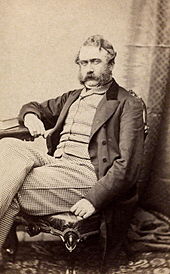William Arthur White

Sir William Arthur White GCB GCMG PC (13 February 1824 – 28 December 1891) was a British diplomat, born in Puławy, in Poland.
He was descended on his father's side from an Irish Roman Catholic family. His mother's family, though not of Polish extraction, owned considerable estates in Poland, where White, though educated at King William's College, Isle of Man, and Trinity College, Cambridge,[1] spent a great part of his early days, and thus gained an intimate knowledge of the Polish language.
From 1843 to 1857 he lived in Poland as a country gentleman, but in the latter year he accepted a post in the British consulate in Warsaw, and had almost at once to perform the duties of acting consul-general. The January Uprising in 1863 gave him an opportunity of showing his immense knowledge of Eastern politics and his combination of diplomatic tact with resolute determination. He was promoted in 1864 to the post of consul at Danzig. The Eastern Question was, however, the great passion of his life, and in 1875 he succeeded in getting transferred to Belgrade as Agent and Consul-General to Serbia.[2]
In 1878 he was made British Agent at Bucharest. In 1884 he was offered by Lord Granville the choice of the legation at Rio de Janeiro or Buenos Aires, and in 1885 Lord Salisbury, who was then at the Foreign Office, urged him to go to Peking, pointing out the increasing importance of that post. White's devoted friend, Sir Robert Morier, wrote in the same sense. But White, who was already acting as ambassador ad interim at Constantinople, decided to wait; and during this year he rendered one of his most conspicuous services.
It was largely owing to his efforts that the war between Serbia and Bulgaria was prevented from spreading into a universal conflagration, and that the unification of Bulgaria and what was then known as eastern Rumelia was accepted by the powers. In the following year he was rewarded with the embassy at Constantinople. He was the first Roman Catholic appointed to a British embassy since the Protestant Reformation.
He pursued consistently the policy of counteracting Russian influence in the Balkans by erecting a barrier of independent states animated with a healthy spirit of national life, and by supporting Austrian interests in the East. To the furtherance of this policy he brought an unrivalled knowledge of all the under-currents of Oriental intrigue, which his mastery of languages enabled him to derive not only from the newspapers, of which he was an assiduous reader, but from the obscurest sources. His bluff and straightforward manner, and the knowledge that with him the deed was ready to follow the word, enabled him at once to inspire confidence and to overawe less masterful rivals.
The official honors bestowed on him culminated in 1888 when he was made a Knight Grand Cross of the Order of the Bath, and was given a seat on the Privy Council. He was still ambassador at Constantinople when he was attacked by influenza during a visit to Berlin, where he died on 28 December 1891.
White married Catherine Kendzior, daughter of Lewis Kendzior, of Danzig. Lady White died Boscombe manor, Bournemouth, on 13 June 1902.[3]
References
- ^ "White, William Adam Arthur Camillis (WHT841WA)". A Cambridge Alumni Database. University of Cambridge.
- ^ "No. 24187". The London Gazette. 5 March 1875.
- ^ "Obituary". The Times. No. 36795. London. 16 June 1902. p. 12. template uses deprecated parameter(s) (help)
- This article incorporates text from a publication now in the public domain: Chisholm, Hugh, ed. (1911). Encyclopædia Britannica (11th ed.). Cambridge University Press.
{{cite encyclopedia}}: Missing or empty|title=(help)
- 1824 births
- 1891 deaths
- British diplomats
- Knights Grand Cross of the Order of St Michael and St George
- Knights Grand Cross of the Order of the Bath
- Members of the Privy Council of the United Kingdom
- People educated at King William's College
- Ambassadors of the United Kingdom to the Ottoman Empire
- Ambassadors of the United Kingdom to Romania
- Ambassadors of the United Kingdom to Serbia
- Deaths from influenza
